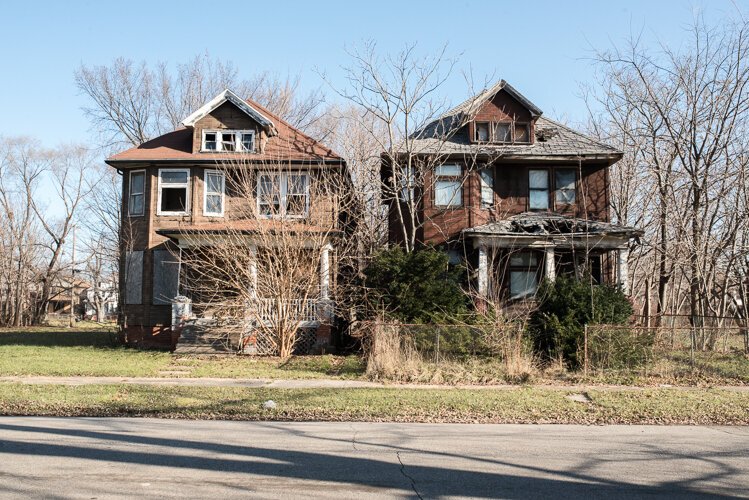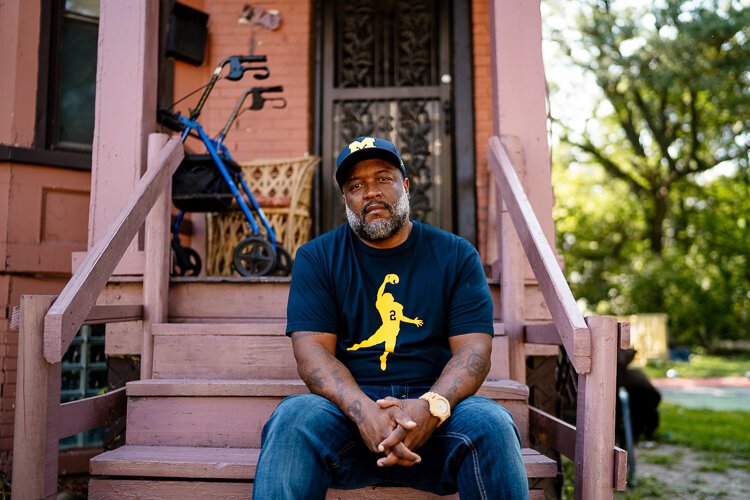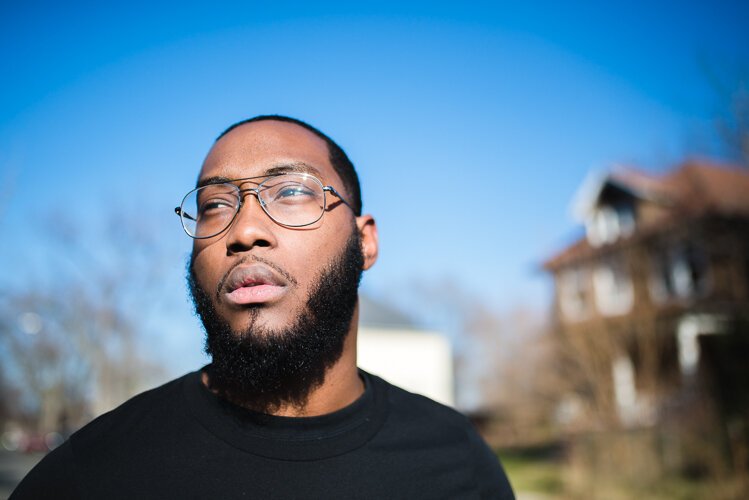Drawing the line: Northwest Goldberg, Northwestern Goldberg Community, or Zone 8?
What's in a name? For some residents, the neighborhood is Northwest Goldberg, named after a popular school board member. To others, it's Zone 8. And for other community members, it's neither.
Corrections and clarification: This story has been updated with comments from Michael Boettcher. An earlier version of this article stated Hamtramck was named after the original property owner. Hamtramck was named after Jean François Hamtramck, a French-Canadian soldier who was the commander of Fort Shelby in Detroit.
Update Nov. 18, 2019: This story has been updated with comments from Dr. Mecha Crockett and Winnie Crockett Kidd, vice president and president, respectively, of the 15th Street Block Club.
For much of Detroit’s history, neighborhood names grew organically, often around major landmarks such as a school, park, or church. Many neighborhoods bear the name of the original property’s owner, such as Bagley. Detroiters hailed themselves and each other by street boundaries — Dexter-Linwood, for example — or by ethnic settlement patterns, as in Greektown. In the past, catchy area names simply weren’t considered amid little outside investment in the city and declining population. But as investment and population patterns change in Detroit, the stakes behind the city’s neighborhood names are growing.
In 2003, the nonprofit Cityscape’s Arthur Mullen and Andrew Koper attempted a comprehensive citywide scheme to name every neighborhood. Drawing inspiration from local landmarks and historic residents, the map didn’t fill in all the blanks, although it did make strides toward establishing many of the distinct districts in the city. Many subsequent maps of Detroit’s neighborhoods were drawn from the Cityscape map, including an equally influential 2013 map by Loveland, which in turn influenced both Google Maps and the City of Detroit’s Neighborhoods map. The latter was an attempt to correct some incorrectly transcribed data in the Loveland map. Google Maps, for instance, included a transcription error that changed longstanding Fiskhorn neighborhood to “Fishkorn;” the city’s map re-labeled the area Fiskhorn. Even those boundaries are often debated, and the official City of Detroit neighborhood map has only existed online for two years. City officials did not return repeated requests for comment for this article.
The map was a “noble effort” by Mullen and Koper to start “conversations on neighborhood identity,” says Michael Boettcher, an urban planner for Wayne County who wrote to Model D after this article was originally published.
“Fishkorn and Fiskhorn are both mistaken versions of Frischkorn, the name and namesake of one of the largest land developers on the west side,” he wrote. “Look at plat or land valuation maps across greater Warrendale and you’ll see several Frischkorn Subdivisions. In fact, any ‘Frischkorn’ or similarly named neighborhood will leave out other acreage the company subdivided because it’s scattered.”
He adds he tried to correct it in the 2003 map, but it never made its way in, resulting in the ensuing misspelling confusion.
What these neighborhoods are called — and why — matters. Their boundaries can shape city policy, policing, and voting districts. Right now, with many neighborhood names still fluid and their borders porous, the power of a name can determine who gets crucial development funds and who gets left out of the city’s revitalization.
The Loveland, Cityscape, and The Neighborhoods maps all feature one section between West Grand Boulevard and the I-94 Service Drive labeled “Northwest Goldberg.” A little shy of a half square mile, the neighborhood, according to the City of Detroit, is home to more than 1,200 properties and about 2,000 people. Among these properties is the historic King Solomon Baptist Church, where Mary Wilson, Florence Ballard, and Diana Ross’s gospel choir performances drew the attention of fellow resident Berry Gordy. The church was equally important in civil rights history, hosting Martin Luther King Jr., Malcolm X, Thurgood Marshall, and other world leaders in the crucial decades of the last century. The neighborhood is also home to the Motown Museum and Henry Ford Hospital, the area’s largest employer.
Northwest Goldberg draws its name from the area school, which opened in 1906 and was named after the first Jewish member of Detroit’s school board, Louis Goldberg. Like much of Detroit, the neighborhood saw its population expand rapidly with the rise of automotive manufacturing, and many of the area’s residents, like nearby Dexter-Linwood, were Jewish. By the 1960s, as many of the city’s Jewish residents moved to its northern suburbs, the area was predominantly Black.
In recent years entrepreneurs like Daniel Washington have jumped on the chance to bring wider recognition of their neighborhood. A longtime resident, Washington is president and founder of NW Goldberg Cares, a nonprofit dedicated to the area’s rehabilitation and beautification. Washington proudly emblazoned “NW Goldberg” on the side of his business’ Detroit Dough truck as well as on a steel sign in the neighborhood’s newly dedicated 6102.ART.PARK.
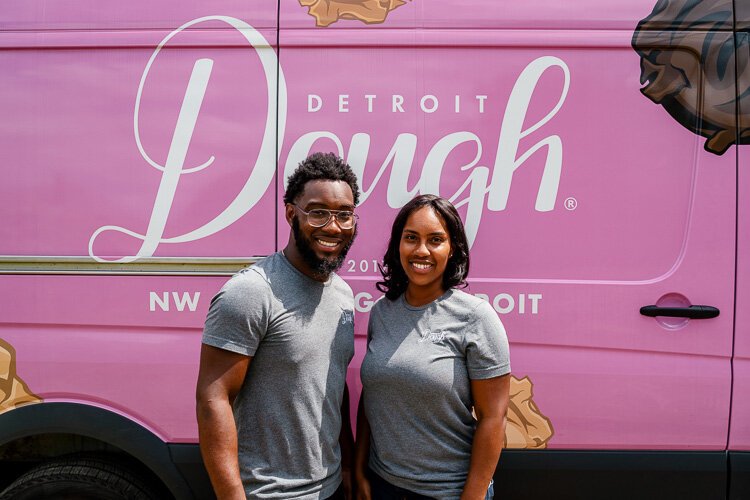
Washington grew up in the neighborhood and was schooled in Walled Lake. He doesn’t recall when he first heard the area referred to as Northwest Goldberg, but he embraces the designation. Calling the neighborhood Northwest Goldberg, he says, “gives people a sense of pride and of commonality.” He hopes that by solidifying the name, residents can take advantage of the resulting marketing potential. “Across the nation,” says Washington, “they’ve found that neighborhoods that are able to capitalize and market their historic names tend to rebound faster. If you look at some of the neighborhoods in New York, Atlanta, California, a lot of neighborhoods are finding and seeking their historic names so that they can market and capitalize on that.” A more memorable name, he believes, will bring investment dollars along with recognition of the neighborhood’s historic value.
“A lot of these inner-city cores have unfortunately been so disinvested in, they went through population withdrawal. They went through high crime,” explains Washington. “Anything positive that happens for the neighborhood gets labeled, wrongfully, New Center. That’s how much of an identity problem that our neighborhood has been faced with. It’s important that we continue to fight for that name to be acknowledged and recognized.” He wants to make sure that the neighborhood takes advantage of every funding opportunity and sees the Northwest Goldberg designation as a step toward more prosperity.
The name Northwest Goldberg is incorrect, say sisters Mecha Crockett and Winnie Crockett Kidd, vice president and president of the 15th Street Block Club.
“Northwestern High School and Goldberg Elementary School determined the boundaries of the community/neighborhood,” Crockett says. Calling the neighborhood Northwest Goldberg ignores the Northwestern High School part of the name.
“When you say Northwest Goldberg, (Northwest) is a direction,” Kidd says.
“The neighborhood is not only named after the elementary school Goldberg but also the community high school Northwestern High School. It has been called Northwestern Goldberg Community for over 50 years,” Kidd says.
To some residents of the district, though, it’s not Northwest Goldberg or Northwestern Goldberg at all: It’s Zone 8 and always has been. The designation came from a police code and refers to the area’s 48208 ZIP code. To them, “Northwest Goldberg” is just a marketing ploy, a scheme designed to aid gentrification. Calling it anything other than Zone 8, they argue, doesn’t reflect the lived experience of the neighborhood’s residents.
Yusef Shakur is a longtime resident and community activist who prefers the designation Zone 8. For Shakur, “The name Northwest Goldberg left when white people left. The only evidence in my lifetime of Northwest Goldberg was the elementary school.” Washington and Shakur have an ongoing lengthy but friendly argument over the name. Although Washington also grew up calling it Zone 8, he thinks the new designation is more marketable.
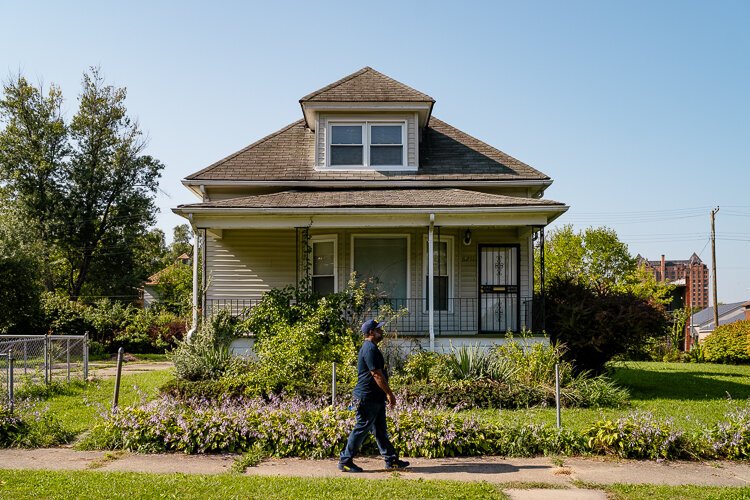
Shakur worries that the emphasis on these neighborhood names threatens to disinvest the community. “The current name of Northwest Goldberg does not reflect the reality of how the people of this neighborhood have suffered, the resources that have been pulled out of that neighborhood,” says Shakur. “So the debate is we’re not going to allow you to come in and use this name for your own individual benefit or your organization’s benefit, not for the collective benefit of the community.”
For Crockett and Kidd, Zone 8 is also incorrect. “We definitely do not want to be known as a ‘drug infested and gang ridden’ community which the name ‘Zone 8’ implies from the ’90s,” Crockett says.
Either way, “the name has nothing to do with marketability, profit, and advertisement. It is community recognition and pride of our high school,” Kidd says.
Alex Hill, anthropologist and founder of cartography project DETROITography, sees the increased emphasis on neighborhood names as a potentially worrying sign. He says, “Detroit historically only has a few well-defined neighborhoods which are typically accompanied by a community association or organization. The quest to name them all is concerning because neighborhood names are often created in this way for marketability or to signify real estate value.” While Washington sees the marketability of Northwest Goldberg, Shakur and Hill see a potential money grab by outside investors that leaves no space for the longtime residents of the community.
“In some cases,” says Hill, “history can help local groups make the case for their neighborhood or push back against old naming that no longer fits with the current neighborhood organization.” Although residents may disagree on whether that’s necessary in regards to their home, they agree that the area is at a crucial stage in its wealth cycle. Shakur and Washington are concerned by what Washington calls the “fractures” appearing in the residents’ unity resulting from a recent community benefits agreement negotiated behind closed doors.
Other neighborhoods have successfully changed their own designation. In the late 1990s, the area of the city then called NEAR (Northeast Area Residents) held a popular vote and changed the neighborhood’s name to Morningside. The change was influenced in part by neighboring area DEAR (Detroit East Area Residents), which saw real estate values go up after it became East English Village.
No one we spoke with from the area recalls being consulted on the name of the area, or can pinpoint at what point an official designation for the neighborhood appeared on a map. Kidd of the 15th Street Block Club says her group is trying to correct the mistaken name of Northwest Goldberg and change it to Northwestern Goldberg Community.
For Hill, “(t)he bigger question I think is the Department of Neighborhoods map of neighborhoods and what process they used to create it and then the process for communities to appeal or request changes.” Without community input and community backing, this neighborhood’s residents are in danger of being marginalized further.
No matter what you call it — Northwest Goldberg, Northwestern Goldberg Community, or Zone 8 — the neighborhood has a rich history as the home of not only Motown but also legacy businesses such as James H. Cole Funeral Home and Detroit Fire Extinguisher Company, both of which celebrated 100 years this year. With the development of Holden Block; a five-story mixed-use building, another project by Grasso Holdings; and more development activity, the area is likely to see some monumental changes. No matter what side they’re on, the Crockett family, Shakur, and Washington, along with their fellow neighborhood residents, are working to make sure the next 100 years see the community thrive.
This article is part of our Equitable Development series, in partnership with Henry Ford Health System, where we explore neighborhood progress and impact of Henry Ford Health System and community partners. Stories illustrate growing an inclusive Detroit in a way that allows people from all races, classes, and abilities to participate and benefit.
